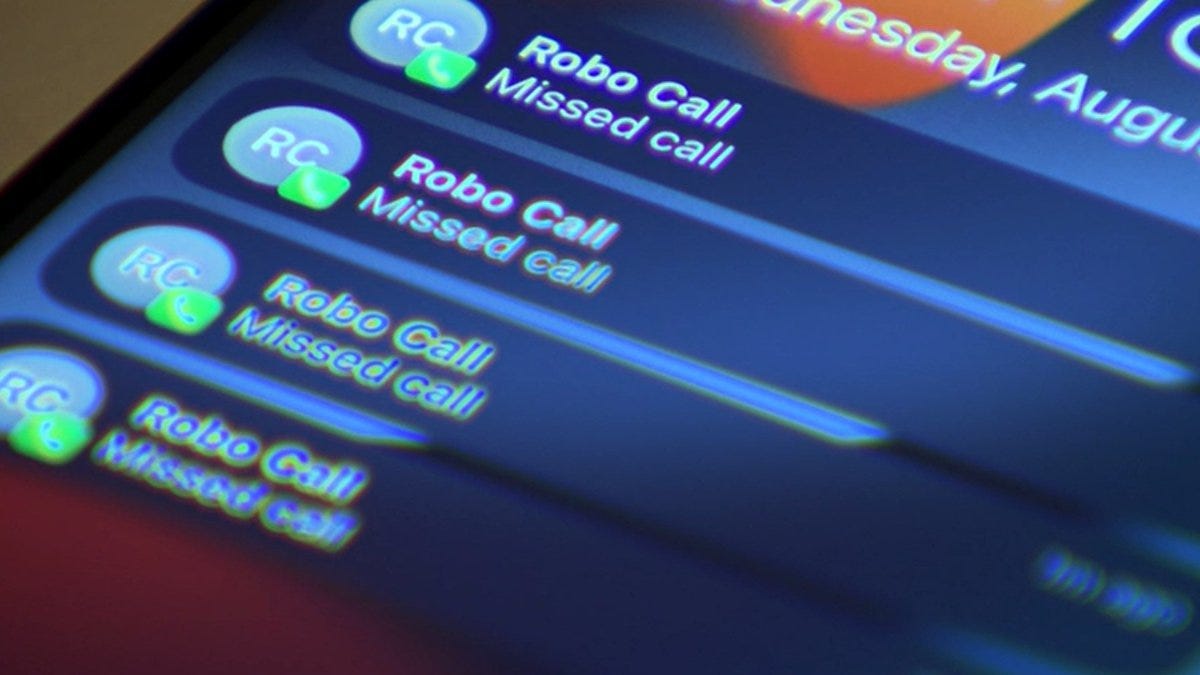FCC issues historic $300 million fine against the largest robocall scam it has ever investigated.
Hi! We have been trying to reach you about your car's extended warranty - 13 words most people never want to hear.
Disclaimer: This article is as informational as it is snarky. For actual legal advice, consult someone who passed the bar exam, not the in-flight snack bar.
Always turn a negative situation into a positive situation.
From CNN News: The Robocall Scam Empire That Almost Got Away 📞⚖️

Hey there, Justice Warriors! Grab your coffee ☕️ and put the kids in front of their favorite show because we've got some piping hot tea to spill. Today, we're diving deep into the world of robocalls, scam artists, and the heroes at the FCC who are finally putting a stop to it. So buckle up, because this is going to be a wild ride 🎢.
Numbers That'll Make Your Head Spin 🤯
Let's kick things off with some jaw-dropping numbers. We're talking about 5 billion robocalls in just a measly three months of 2021. Yes, you read that right—5 billion with a 'B.' That's enough to call every person in the United States 15 times over. Imagine that, 15 calls for every man, woman, and, yes, even your little ones. It's like a horror movie, but the villain is your own phone 📱.
Now, you might be thinking, "Well, it's just a call." But let's get real. These calls are more than just annoying; they're dangerous. They're designed to scam you, to take your hard-earned money and laugh all the way to the bank. And who's laughing? Two men: Roy Cox, Jr. and Aaron Michael Jones. But guess what, boys? The laugh track just got cut 🙅♀️.
Meet Roy Cox, Jr. and Aaron Michael Jones, the puppet masters of your daily annoyance. These aren't your run-of-the-mill scammers; these are professionals with a capital 'P.' They orchestrated a complex robocall sales lead generation scheme through their company, Sumco Panama, and its numerous affiliated domestic and foreign entities. Their game? Duping people into purchasing vehicle service contracts disingenuously marketed as car warranties.
But here's where it gets interesting. The FCC didn't just stumble upon these guys; they've been on their radar since as far back as 2018. That's right, these scam artists have been at it for years, perfecting their craft and dodging the law. But every dog has its day, and for Cox, Jr. and Jones, the day of reckoning has come 🌅.
When the law comes knocking, you can't just hit 'Decline.' The FCC proposed that Cox, Jr. and Jones be fined almost $300 million for their "egregious violations." And let's be clear, the term "egregious" is putting it lightly. These men didn't just bend the rules; they shattered them into a million pieces and danced on the shards.
The FCC's decision is historic, marking the largest action in its history. And it's about time! For too long, these robocallers have been a thorn in our sides, interrupting dinners, school pick-ups, and even those rare moments of peace when the kids are finally asleep. But no more. The FCC has introduced a number of measures aimed at tackling this tidal wave of sham notices, and the results are already showing. One robocall blocking app, Robokiller, estimated a decline in similar calls by as much as 99 percent. Can we get a 'Hallelujah'? 🙌
You see, when the FCC took down these two masterminds, it wasn't just a win for them; it was a win for all of us. The ripple effect of their actions has been monumental. Robokiller's stats show a 99% decline in similar robocalls. That's not just a drop in the bucket; the whole bucket is flipped over and emptied out.
Let's talk about the real impact of these robocalls. Sure, they're irritating, but they also pose a significant risk, especially to vulnerable populations like the elderly and, yes, busy moms like us. Scammers often use fear tactics to pressure people into making quick decisions. "Your car warranty is about to expire!" they say, preying on your fears of being stranded on the road with your kids in the backseat. It's manipulative, it's deceitful, and it's downright criminal. 🚔
What Makes This a Crime? ⚖️
Now, you might be wondering, "What makes robocalls illegal?" Well, let's get into the nitty-gritty. According to the FCC, these robocalls met the criteria for "egregious violations," which means they didn't just cross the line; they leapt over it with a pole vault. The Telephone Consumer Protection Act (TCPA) prohibits unsolicited calls to your cell phone without your consent. And let's be real, who in their right mind would consent to this madness? 🤷♀️
These scammers are savvy marketers. They know how to push our buttons, literally and figuratively. By disguising their vehicle service contracts as car warranties, they almost had us fooled. But here's the kicker: these aren't warranties. They're service contracts that often come with a plethora of hidden fees and conditions. It's a classic bait-and-switch, and it's as old as time. 🕰️
So, where do we go from here? First, let's give a big shoutout to the FCC for stepping up and taking action. But the fight isn't over. We need to stay vigilant. Keep reporting those suspicious calls and texts. And let's push for even stricter regulations and heavier fines for these scam artists. Because, let's face it, a $300 million fine is a good start, but it's just that—a start. 💪

💊Tylenol® used during pregnancy linked to ADHD & Autism by Multiple Studies
We're reader-supported and only partner with Attorneys and brands we trust. When you buy through links on our site we may receive a small commission at no extra cost to you. There is only one corner of the universe you can be certain of improving, and that's your own self.








